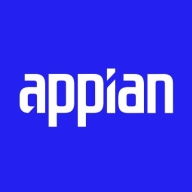

Appian and Adobe ColdFusion compete in the application development category. Appian appears to have an upper hand due to its scalability and robust solution capabilities across a wide range of scenarios, while ColdFusion focuses on rapid web application development and quick deployment.
Features: Appian offers low-code design, advanced process automation, and extensive integration capabilities, streamlining complex workflows. Adobe ColdFusion provides built-in functionalities for scripting, efficient server management, and rapid development, ideal for web apps.
Room for Improvement: Appian could improve its initial setup cost, simplicity in complex integrations, and user interface customization. ColdFusion might enhance its scalability, update frequency, and expand its use cases beyond web-specific tasks.
Ease of Deployment and Customer Service: Appian offers adaptable deployment across enterprise environments with strong customer support for complex needs. ColdFusion ensures quick web-focused deployment with straightforward implementation and support tailored to web apps.
Pricing and ROI: Appian involves a higher initial investment with extensive ROI through broad capabilities, whereas ColdFusion offers competitive pricing with significant ROI for web-specific applications. Appian targets a wide spectrum of returns, while ColdFusion's cost-effectiveness suits web-focused returns.
Using Appian is saving us five full-time employees, which is significant since we currently have only four team members.
They see return on investment in terms of cost savings, time savings, more efficient processes, and more efficient employees.
Appian is very efficient, allowing us to build a lot of applications within a financial year, making it cost-effective.
I would give Appian's customer support 10 out of 10 due to their next-level support.
The technical support for Appian rates as 10 out of 10 because they have a great support team.
Their customer service is responsive, and the team is very prompt for support.
On a scale of one to 10, Appian rates as a nine for scalability.
Our volume has increased by 20% in the two years since using Appian, and it can handle the increased volume effectively.
Appian is scalable, but it depends on how you build your applications.
We have tested Appian during peak usage and off-peak times, and we have not experienced any issues such as lagging or system disruptions.
It depends on how it has been designed and how it has been configured.
The stability of Appian would rate as nine, as it's a stable environment.
If Appian can suggest the country based on that address, it would significantly decrease error rates in processing remittance.
It has room to improve for use cases where the users are public facing, where anonymous users could come to a site and run a business workflow or interact with some data.
If there is a very complex process that includes a lot of data transitioning and memory-centric processes, it consumes a lot of memory.
Appian provides value for money, is easy to use, has a straightforward setup procedure, and offers great support from the Appian team.
On the pricier side, both Appian and Pega are enterprise-level solutions, placing them on the slightly higher side.
The pricing of Appian is based on the number of users and generally ranges from 70 to 100 USD per user per month.
Previously we could process only five to ten transactions within an hour, but now, after switching to Appian, we can process about 100 transactions in an hour, making it 10 times faster.
Appian is aiding in leveraging AI technologies in multiple ways: one way is for developers, as they make development efficient and quick by enabling developer co-pilots across various phases of the application, which helps design Appian quickly and provides suggestions along the way.
The zero-code integration feature is remarkable, allowing for ease of data transfer and workflow enhancement.
| Product | Market Share (%) |
|---|---|
| Appian | 5.8% |
| Adobe ColdFusion | 1.1% |
| Other | 93.1% |


| Company Size | Count |
|---|---|
| Small Business | 20 |
| Midsize Enterprise | 9 |
| Large Enterprise | 42 |
Adobe ColdFusion is a powerful server-side programming language for website and internal solution development. It is rapid application development (RAD) product that is easy to learn, well maintained, easily scalable in a clustered environment, stable, and can be integrated with various services.
The solution has helped organizations improve productivity and efficiency by developing tools that address specific needs and becoming safer using the product. Adobe ColdFusion is an excellent choice for organizations looking for a powerful and easy-to-use server-side programming language.
Appian is a unified low-code platform and solution used by businesses to build enterprise applications and workflows. This product adapts to the needs of clients and the technologies they are already using to combine their data in a single workflow and maximize resources. The platform has four main components through which it transforms the work process for companies of various sizes. They are:
Appian is utilized across a diverse set of industries, including automotive and manufacturing, energy and utilities, education, financial services, telecom and media, transportation, retail, insurance, healthcare, and life sciences. The most frequent use cases of Appian are customer journey, governance, risk and compliance, operational efficiency, supply chain, distributed order management, and environmental, social, and governance (ESG) management.
Appian Features
Appian has various features that allow users to create solutions for their businesses. These features can be separated into a few groups according to function, including automation, low-code application development, and integrations and data. Some of the most frequently used features of Appian include:
Appian Benefits
The benefits of using Appian include:
Reviews from Real Users
A practice leader - digital process automation at a computer software company values Appian highly because the product is easy to develop, low-code, and has a good user interface.
Alan G., an advisory board member at Codecon VR, Appian offers a clear application life cycle, easy to learn documentation, and comes with a fundamentals course.
We monitor all Rapid Application Development Software reviews to prevent fraudulent reviews and keep review quality high. We do not post reviews by company employees or direct competitors. We validate each review for authenticity via cross-reference with LinkedIn, and personal follow-up with the reviewer when necessary.